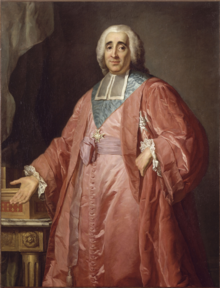René-Nicolas-Charles-Augustin de Maupeou
René-Nicolas-Charles-Augustin de Maupeou (born February 25, 1714 - † July 29, 1792 in Thuit in the Eure department ), Marquis de Morangles, de La Mothe-Chandeniers and de Bully, Vicomte de Bruyères, was Chancellor of France .
Life
Maupeou was the eldest son of René-Charles de Maupeou (1688-1775), seigneur du marquisat de La Mothe-Chandeniers, vicomte de Bruyères , who had been President of the Parliament of Paris from 1743 to 1757 . In 1744 he married a wealthy heiress, Anne de Roncherolles, a cousin of Madame d'Épinay , entered public life and became his father's right-hand man in the conflicts between Parliament and Christophe de Beaumont , Archbishop of Paris, who was supported by the court. Maupeou himself was President of Parliament between 1763 and 1768, a period during which Voltaire posthumously resumed the trial of Jean Calas . In 1768 he became Chancellor, that is, as much as Minister of Justice, through the protection of Choiseul , whose overthrow two years later was essentially his work. In this position he succeeded his father, who had only held it for a few days.
He decided to support the king's authority over parliament, which, in association with the 10 or so parliaments of the provinces, tried to reclaim the tasks of the Estates-General. He allied himself with the Duke of Aiguillon and Madame Dubarry and secured Abbé Joseph Marie Terray the office of General Controller.
The battle arose at the trial of the case of Duke Aiguillon, ex-governor of Brittany, and La Chalotais , general procurator of the province, who had been arrested by the governor on charges against his administration. When Parliament showed its hostility to Aiguillon, Maupeou left the trial by Louis XV. knock down. Ludwig reacted to parliamentary remonstrations with a lit de justice , in which he demanded that the trial files be handed over. On November 27, 1770, a dit de reglement et de discipline appeared , which was announced by the Chancellor. It prohibited the judges (“magistrats”) from defining the various branches or “classes” of parliament as parts of an “indivisible” single parliament; the exchange of files and remonstrations between the various parliaments was prohibited. Furthermore, a strike was prohibited by the parliaments and demanded that after a one-off remonstration against a royal decree, parliament should not block the registration of an edict.
The judges refused to register this edict; it was registered in a lit de justice on December 7th at Versailles, whereupon the parliament ceased its activity. After five summons to resume their duties, the magistrates were taken by surprise one by one by musketeers on the night of January 19, 1771 and had to confirm another request to return with yes or no. Thirty-eight judges gave a positive answer, but when their former colleagues were banished by Lettres de cachet , they withdrew their consent and were subsequently banished as well. Maupeou installed a royal court of justice ( Parlement Maupeou ), which was supposed to take over the judiciary until new higher courts of justice were established in the provinces and a new parliament in Paris. Next, the cour des aides was abolished.
Voltaire praised this revolution and applauded the abolition of the old hereditary judicial offices. In general, however, Maupeou's policies were seen as the triumph of tyranny. The protests of the princes, the nobility and the lower courts of justice were punished with exile and repression, and towards the end of 1771 the new judicial organization was introduced.
The death of Louis XV. in May 1774 ruined the chancellor. After the re-establishment of parliaments by Louis XVI. another argument began between the king and the judiciary. Maupeou and Terray were replaced by Malesherbes and Turgot . Until his death in 1792 Maupeou lived in seclusion and could still see the fall of the Ancien Régime .
The separation of the judiciary from politics and the reform of the abuse associated with the hereditary magistrates were later confirmed by the revolution .
literature
- Julian Swann: Politics and the Parlement of Paris under Louis XV, 1754–1774. ISBN 052148362X
- Jules Flammermont: Le Chancelier Maupeou et les parlements.
Web links
- http://chnm.gmu.edu/revolution/d/350/ - Edict of November 27, 1770 (English)
- http://chnm.gmu.edu/revolution/d/351/ - Edict of February 23, 1771 (English)
| predecessor | Office | successor |
|---|---|---|
| René Charles de Maupeou |
Chancellor of France September 18, 1768 - August 24, 1774 |
Armand Thomas Hue |
| personal data | |
|---|---|
| SURNAME | Maupeou, René-Nicolas-Charles-Augustin de |
| BRIEF DESCRIPTION | Chancellor of France |
| DATE OF BIRTH | February 25, 1714 |
| DATE OF DEATH | July 29, 1792 |
| Place of death | Thuit |
